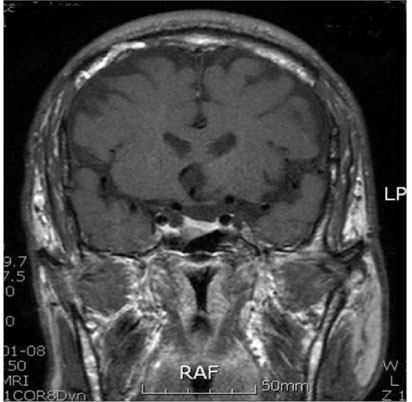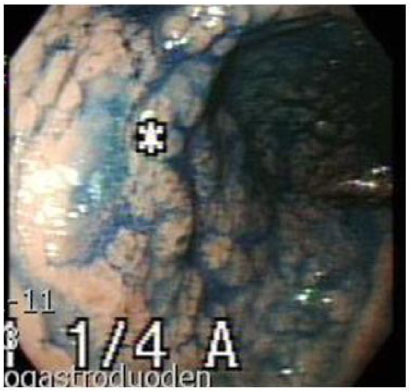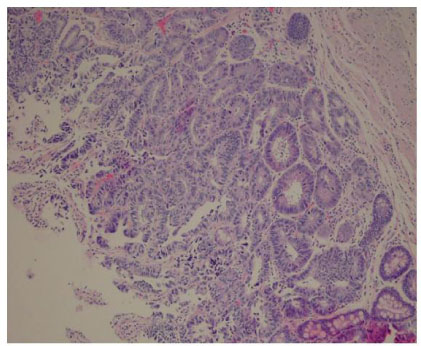J Korean Soc Endocrinol.
2006 Apr;21(2):165-169. 10.3803/jkes.2006.21.2.165.
A Case of Early Gastric Cancer Coincidentally Developed in a Patient with Acromegaly
- Affiliations
-
- 1Department of Internal Medicine, College of Medicine, The Catholic University of Korea, Korea.
- KMID: 1511957
- DOI: http://doi.org/10.3803/jkes.2006.21.2.165
Abstract
- Acromegaly is associated with an increased risk for a variety of cancers such as colon cancer, prostate cancer and breast cancer. However, there have been few reports of gastric cancer developing in an acromegaly patient. A 66-year-old man suffered with diabetes mellitus and hypertension for 15 years, and he visited the endocrinology department due to dizziness. On physical examination, the biochemical studies and the sella MRI, he showed the typical features of acromegaly with pituitary microadenoma. During the cancer screening studies to find the cause of anemia, early gastric cancer was diagnosed by pathologic examination of the tissue biopsies. We described the summary of characteristics of the patient and reviewed literature.
MeSH Terms
Figure
Reference
-
1. Colao A, Ferone D, Marzullo P, Lombardi G. Systemic complications of acromegaly: epidemiology, pathogenesis, and management. Endocr Rev. 2004. 25:102–152.2. Jenkins PJ. Acromegaly and Cancer. Horm Res. 2004. 62:suppl 1. 108–115.3. Baris D, Gridley D, Ron E, Weiderpass E, Mellmkjaer L, Ekbom A. Acromegaly and cancer risk: a cohort study in Sweden and Denmark. Cancer Causes Control. 2002. 13:395–400.4. Melmed S. Acromegaly and cancer: not a problem? J Clin Endocrinol Metab. 2001. 86:2929–2934.5. Marek B, Kajdaniuk D, Kos-Kudla B, Ostrowska Z, Niedziolka D, Janczewska-Kazek E. Acromegaly and the risk of cancer. Pathophysiology. 2001. 8:69–75.6. Le Roith D. Regulation of proliferation and apoptosis by the insulin-like growth factor I receptor. Growth Horm IGF Res. 2000. 10:suppl 1. S12–S13.7. Aaronson SA. Growth factors and cancer. Science. 1991. 254:1146–1153.8. Akagi Y, Liu W, Zebrowski B, Xie K, Ellis LM. Regulation of vascular endothelial growth factor expression in human colon cancer by insulin-like growth factor-I. Cancer Res. 1998. 58:4008–4014.9. Oh Y, Muller HL, Pham H, Rosenfeld RG. Demonstration of receptors for insulin-like growth factor binding protein-3 on Hs578T human breast cancer cells. J Biol Chem. 1993. 268:26045–26048.10. Ron E, Gridley G, Hrubec Z, Page W, Arora S, Fraumeni JF Jr. Acromegaly and gastrointestinal cancer. Cancer. 1991. 68:1673–1677.11. Hasegawa H, Onda M, Matsukura N, Naito Z, Maruyama H, Tokunaga A. Hemorrhagic gastric carcinoma in an acromegalic patient. J Nippon Med Sch. 2001. 68:266–270.12. Mestron A, Webb SM, Astorga R, Benito P, Catala M, Gaztambide S, Gomez JM, Halperin I, Lucas-Morante T, Moreno B, Obiols G, Pablos PD, Paramo C, Pico A, Torres E, Varela C, Vazquez JA, Zamora J, Albareda M, Gilabert M. Epidemiology, clinical characteristics, outcome, morbidity and mortality in acromegaly based on the Spanish Acromegaly Registry (Registro Espanol de Acromegalia, REA). Eur J Endocrinol. 2004. 151:439–446.13. Kiyoko A, Shouji S, Naoko S, Michio K, Takeshi O. A rare case of gastric cancer in an acromegalic patient. J Gastroenterol. 1997. 32:528–532.14. Thomson MA, Cox AJ, Whitehead RH, Jonas HA. Autocrine regulation of human tumor cell proliferation by insulin-like growth factor II: an in-vitro model. Endocrinology. 1990. 126:3033–3042.15. Durrant LG, Watson SA, Hall A, Morris DL. Co-stimulation of gastrointestinal tumour cell growth by gastrin, transforming growth factor α and insulin like growth factor-I. Br J Cancer. 1991. 63:67–70.16. Chung CK, Antoniades HN. Expression of c-sis/platelet-derived growth factor B, insulin-like growth factor I, and transforming growth factor α messenger RNAs and their respective receptor messenger RNAs in primary human gastric carcinomas: in vivo studies with in situ hybridization and immunocytochemistry. Cancer Res. 1992. 52:3453–3459.17. Guo YS, Beauchamp D, Jin GF, Townsend CM Jr, Thomson JC. Insulin like growth factor-binding protein modulates the growth response to insulin like growth factor 1 by human gastric cancer cells. Gastroenterology. 1993. 104:1595–1604.
- Full Text Links
- Actions
-
Cited
- CITED
-
- Close
- Share
- Similar articles
-
- A Case of Pituitary Mucormycosis in Diabetic Patient with Acromegaly and Gastric Cancer
- A Case of Acromegaly Associated with Lung and Gastric Cancer
- Screening of gastric cancer
- A case of acromegaly with empty sella syndrome associated with colonic neoplasm
- A Case of Advanced Gastric Cancer, Developed from Endoscopic Diagnosis of Early Gastric Cancer





